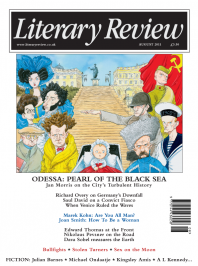Joanna Hines
Joanna Hines on the Latest Historical Novels
In the twilight years of her reign, Elizabeth I was not allowed to appear as an old woman: she had to remain Gloriana, reliant on wigs and paint and costumes to sustain the illusion. Equally, Jeanne de Musset, the titular heroine of Sarah Gristwood’s The Girl in the Mirror, is unable to appear as a young woman. A child refugee from massacres in the Low Countries, she is reared as a boy and develops a passion for plants and gardens. She finds employment in the house of Robert Cecil, Elizabeth I’s trusted adviser, where, as she soon discovers, ‘reflection and illusion’ are paramount. Loyal to Cecil, she is nevertheless as susceptible as the old queen herself to the charm and brilliance of the young Lord Essex, and Jeanne/Jan is caught up in the unfolding tragedy of his final months. Gristwood, previously a biographer, knows the Elizabethan world intimately; she has made use of a legend that grew up around Essex’s last desperate attempt to evade execution and which provides the climax to this absorbing tale – though occasionally she seems to find it hard to resist the historian’s love of analysis and allow the story itself to unfold.
Why do biographers turn to fiction? Is it because they are frustrated by the inevitable gaps and guesswork, and long to enter their protagonists’ minds? Stella Tillyard, who has been hugely successful with non-fiction works such as Aristocrats, has made a similar transition with Tides of War (Chatto

Sign Up to our newsletter
Receive free articles, highlights from the archive, news, details of prizes, and much more.@Lit_Review
Follow Literary Review on Twitter
Twitter Feed
It wasn’t until 1825 that Pepys’s diary became available for the first time. How it was eventually decrypted and published is a story of subterfuge and duplicity.
Kate Loveman tells the tale.
Kate Loveman - Publishing Pepys
Kate Loveman: Publishing Pepys
literaryreview.co.uk
Arthur Christopher Benson was a pillar of the Edwardian establishment. He was supremely well connected. As his newly published diaries reveal, he was also riotously indiscreet.
Piers Brendon compares Benson’s journals to others from the 20th century.
Piers Brendon - Land of Dopes & Tories
Piers Brendon: Land of Dopes & Tories - The Benson Diaries: Selections from the Diary of Arthur Christopher Benson by Eamon Duffy & Ronald Hyam (edd)
literaryreview.co.uk
Of the siblings Gwen and Augustus John, it is Augustus who has commanded most attention from collectors and connoisseurs.
Was he really the finer artist, asks Tanya Harrod, or is it time Gwen emerged from her brother’s shadow?
Tanya Harrod - Cut from the Same Canvas
Tanya Harrod: Cut from the Same Canvas - Artists, Siblings, Visionaries: The Lives and Loves of Gwen and Augustus John by Judith Mackrell
literaryreview.co.uk